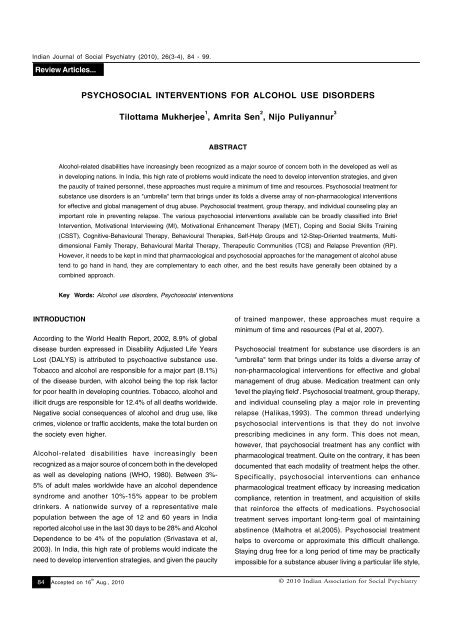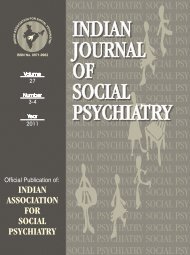IJSP-2010(3-4) - Indian Association For Social Psychiatry
IJSP-2010(3-4) - Indian Association For Social Psychiatry
IJSP-2010(3-4) - Indian Association For Social Psychiatry
Create successful ePaper yourself
Turn your PDF publications into a flip-book with our unique Google optimized e-Paper software.
<strong>Indian</strong> Journal of <strong>Social</strong> <strong>Psychiatry</strong> (<strong>2010</strong>), 26(3-4), 84 - 99.<br />
Review Articles...<br />
84<br />
PSYCHOSOCIAL INTERVENTIONS FOR ALCOHOL USE DISORDERS<br />
Tilottama Mukherjee 1<br />
, Amrita Sen 2<br />
, Nijo Puliyannur 3<br />
ABSTRACT<br />
Alcohol-related disabilities have increasingly been recognized as a major source of concern both in the developed as well as<br />
in developing nations. In India, this high rate of problems would indicate the need to develop intervention strategies, and given<br />
the paucity of trained personnel, these approaches must require a minimum of time and resources. Psychosocial treatment for<br />
substance use disorders is an "umbrella" term that brings under its folds a diverse array of non-pharmacological interventions<br />
for effective and global management of drug abuse. Psychosocial treatment, group therapy, and individual counseling play an<br />
important role in preventing relapse. The various psychosocial interventions available can be broadly classified into Brief<br />
Intervention, Motivational Interviewing (MI), Motivational Enhancement Therapy (MET), Coping and <strong>Social</strong> Skills Training<br />
(CSST), Cognitive-Behavioural Therapy, Behavioural Therapies, Self-Help Groups and 12-Step-Oriented treatments, Multidimensional<br />
Family Therapy, Behavioural Marital Therapy, Therapeutic Communities (TCS) and Relapse Prevention (RP).<br />
However, it needs to be kept in mind that pharmacological and psychosocial approaches for the management of alcohol abuse<br />
tend to go hand in hand, they are complementary to each other, and the best results have generally been obtained by a<br />
combined approach.<br />
Key Words: Alcohol use disorders, Psychosocial interventions<br />
INTRODUCTION<br />
According to the World Health Report, 2002, 8.9% of global<br />
disease burden expressed in Disability Adjusted Life Years<br />
Lost (DALYS) is attributed to psychoactive substance use.<br />
Tobacco and alcohol are responsible for a major part (8.1%)<br />
of the disease burden, with alcohol being the top risk factor<br />
for poor health in developing countries. Tobacco, alcohol and<br />
illicit drugs are responsible for 12.4% of all deaths worldwide.<br />
Negative social consequences of alcohol and drug use, like<br />
crimes, violence or traffic accidents, make the total burden on<br />
the society even higher.<br />
Alcohol-related disabilities have increasingly been<br />
recognized as a major source of concern both in the developed<br />
as well as developing nations (WHO, 1980). Between 3%-<br />
5% of adult males worldwide have an alcohol dependence<br />
syndrome and another 10%-15% appear to be problem<br />
drinkers. A nationwide survey of a representative male<br />
population between the age of 12 and 60 years in India<br />
reported alcohol use in the last 30 days to be 28% and Alcohol<br />
Dependence to be 4% of the population (Srivastava et al,<br />
2003). In India, this high rate of problems would indicate the<br />
need to develop intervention strategies, and given the paucity<br />
Accepted on 16 th<br />
Aug., <strong>2010</strong><br />
of trained manpower, these approaches must require a<br />
minimum of time and resources (Pal et al, 2007).<br />
Psychosocial treatment for substance use disorders is an<br />
"umbrella" term that brings under its folds a diverse array of<br />
non-pharmacological interventions for effective and global<br />
management of drug abuse. Medication treatment can only<br />
'level the playing field'. Psychosocial treatment, group therapy,<br />
and individual counseling play a major role in preventing<br />
relapse (Halikas,1993). The common thread underlying<br />
psychosocial interventions is that they do not involve<br />
prescribing medicines in any form. This does not mean,<br />
however, that psychosocial treatment has any conflict with<br />
pharmacological treatment. Quite on the contrary, it has been<br />
documented that each modality of treatment helps the other.<br />
Specifically, psychosocial interventions can enhance<br />
pharmacological treatment efficacy by increasing medication<br />
compliance, retention in treatment, and acquisition of skills<br />
that reinforce the effects of medications. Psychosocial<br />
treatment serves important long-term goal of maintaining<br />
abstinence (Malhotra et al,2005). Psychosocial treatment<br />
helps to overcome or approximate this difficult challenge.<br />
Staying drug free for a long period of time may be practically<br />
impossible for a substance abuser living a particular life style,<br />
© <strong>2010</strong> <strong>Indian</strong> <strong>Association</strong> for <strong>Social</strong> <strong>Psychiatry</strong>



